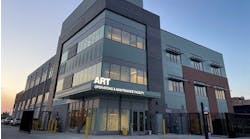Metro’s Board Approves Los Angeles County Traffic Improvement Plan
The Los Angeles County Metropolitan Transportation Authority (Metro) Board of Directors has approved a bold transportation expenditure plan for placement on the upcoming November ballot. The sales tax measure calls for a sustained funding approach that, if approved by the voters, would accelerate and fund a wide variety of transit and highway projects, roadway improvements and pedestrian and bike paths.
“Today’s action paves the way towards building and sustaining a world-class 21st century transportation system here in Los Angeles County to accommodate the region’s growing needs,” said Metro Board Chair Mark Ridley-Thomas. “The placement of this important measure before the voters in November is a giant step in order to improve mobility, create jobs and improve the quality of life for all of L.A. County.”
The Los Angeles County Traffic Improvement Plan would also devote billions of dollars to commuter rail, transit operations and projects to keep buses, trains and facilities in good repair. The plan would return revenues to local cities on a per capita basis — money those cities would spend on their own local transportation improvements.
“Working hand in hand every step of the way with our stakeholders during this entire process has brought together a plan of action to ease traffic, build out our rail network and enhance bus service,” said Metro Board First Vice Chair John Fasana. “It will now be up to the voters of L.A. County on whether or not they want a truly balanced transportation system for the entire region.”
In March, Metro staff presented a 40-year draft plan that would have asked voters to increase the countywide sales tax by a half-cent and to continue the existing Measure R tax for 18 years, meaning both would run through 2057. In May, the Metro Board of Directors asked agency staff to model a sustained “no sunset” scenario to determine additional benefits that could be delivered if the tax continued beyond 40 years.
“Our region is on the move — and it’s time we stop letting traffic hold us back,” said Los Angeles Mayor and MTA Board Second Vice Chair Eric Garcetti. “This bold transportation plan will relieve our congested roads, connecting our region with the robust, comprehensive transportation system we need and deserve. It also adds thousands of local jobs and the constant stream of funding we need to keep our system running smoothly for generations to come."
Revised Expenditure Plan
Under the new sustained funding scenario, 12 projects could be accelerated from the previously presented 40-year plan. The revised plan also allows the Eastside Gold Line Extension to be built to both South El Monte and Whittier and would fund the L.A. County section of a new freeway, energy and high-speed rail corridor between the Antelope Valley and San Bernardino County.
In addition, three projects would be upgraded later in the plan: a bus rapid transit project between North Hollywood and Pasadena could be light rail; a high-capacity transit project on Vermont Avenue between Hollywood and the Green Line in South L.A. could be a subway; and a proposed bus rapid transit project on Lincoln Boulevard could be light rail.
In the plan, the sustained funding approach will increase funding for local return to the 88
cities and unincorporated areas in L.A. County from 16 percent to 17 percent starting in 2017 and increasing to 20 percent beginning in 2039. The plan will increase Metrolink funding by one percent starting in 2040.
The foundation of the plan includes a host of transportation improvement projects submitted by stakeholders across the county. Metro staff evaluated those projects against key performance metrics to determine how they would ease congestion and enhance mobility, provide better access to key destinations, improve safety, grow the local economy and enhance quality of life.
“This plan is the most aggressive yet balanced initiative in this country today,” said Metro CEO Phillip A. Washington. “It goes far beyond building and delivering projects. It includes operating and maintaining the system we build, takes full advantage of technology as it develops, and provides an opportunity to not only tackle the transportation infrastructure challenges of today, but once and for all.”
Among the challenges of a 40-year sales tax ballot measure were fewer major projects that could be built, limits on the ability to accelerate projects and fewer opportunities to leverage additional state and federal funds. A 40-year plan would not have provided ongoing funding to maintain and keep transportation systems in good repair.
Some of the projects that would be accelerated under the new sustained plan include Orange Line improvements (five-year acceleration), the West Santa Ana Branch Project – Segment 1 (one-year acceleration) and segment two (six-year acceleration), I-5 widening between the I-605 and I-710 (five-year acceleration), Crenshaw/LAX Line Northern Extension (eight-year acceleration) and the Green Line Extension to the Norwalk Metrolink station (five-year acceleration).
The plan also provides funds for paratransit for the disabled, affordable fares for seniors, students and the disabled, active transportation programs to better connect transit to surrounding neighborhoods and safety programs.
Revised Expenditure Plan
Following three months of public review and input — including community meetings and Telephone Town Halls that reached tens of thousands of L.A. County residents — new polling results show that 72 percent of those surveyed would vote for a ballot measure with a sustained funding approach. Benefits noted by respondents included keeping fares affordable for seniors, students and the disabled; creating jobs; repairing potholes; earthquake retrofitting bridges and improving freeway traffic flow. In addition, providing transportation options for an aging population was another reason that respondents said they were more inclined to vote for the measure.
The Board today adopted an ordinance that will guide implementation of the expenditure plan and a resolution requesting that the Los Angeles County Board of Supervisors place the ordinance on the ballot with specific ballot language for the November 8, 2016, countywide general election. The Board also approved a Metro staff request to add $10.9 million to the FY2017 budget to fund election related and public information activities.
The Board took the action to approve the plan today in light of the announcement of the cancellation of a Senate Transportation and Housing Public Hearing organized by Senator Tony Mendoza which was planned to further look at the proposed plan.



